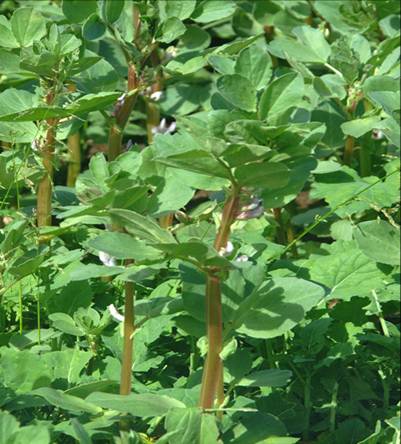
With nitrogen prices nearing £300 per tonne, variable yields from oilseed rape and strengthening prices for pulse crops, more growers are deciding to plant winter beans this autumn. But growers have faced significant change to their weed control programmes in recent times and have adapted well to a market with fewer herbicides. However this autumn sees further significant change, namely the loss of simazine, which will force growers to reconsider their weed control options. BASF are reminding growers that the residual-acting herbicide Nirvana could well become the preferred option for weed control in winter beans in the future.
"Containing imazamox and pendimethalin, Nirvana was introduced to the UK market last year and is recommended pre-emergence in all varieties of winter beans as well as in vining peas, combining peas and spring beans. With the loss of simazine, it is bound to take a significant position in the market as it provides strong residual activity and excellent over-winter weed control, with very good crop safety," explains Jonathan Ball, BASF Legume Product Manager.
He points out that Nirvana controls the most important weeds in winter beans, including Charlock, Common Poppy, Fat-hen and Speedwells as well as Common Chickweed, Fumitory, Henbit Dead-nettle, Red Dead-nettle and Scarlet Pimpernel. "Imazamox enhances the control of several key weeds, such as Charlock, Black-bindweed, Cleavers and Volunteer Oilseed rape, compared with equivalent rates of straight pendimethalin. Consequently Nirvana offers a broader weed spectrum than straight pendimethalin."
"It also offers useful additional bonus activity in the suppression of grass-weeds such as Black-grass and Annual Meadow-grass," says Jonathan.
To help get the best from Nirvana this autumn, BASF's Steve Dennis advises growers to make sure that seed is fully covered and drilled to a depth of at least 25 mm settled soil. "It is important to level and consolidate loose, cloddy or open tilth before application, particularly if winter beans are sown by broadcasting and ploughing-in of the seed. The recent milder autumns have made it easier to produce better seedbeds for beans, which will, of course, improve the overall efficacy of the pre-emergence herbicides. Nirvana is applied pre-emergence of the crop and should not be applied once the crop plumule is less than 13 mm (0.5 inches) from the soil surface. The soil and seedbed requirements and precautions are essentially the same as for the residual-acting Stomp 400 SC."
Steve Dennis advises that in winter beans Nirvana should be applied at the full rate of 4.5 l/ha for maximum over-winter activity and optimum efficacy when under high weed pressure. "For general weed control in low to moderate weed populations, Nirvana applied between 3-4 l/ha will be appropriate for many situations. It can also be used at 2.5-3 l/ha in conjunction with suitable tank-mix partners such as clomazone for enhanced control of certain problem weeds such as Cleavers or Shepherd's-purse. But be aware that this lower rate may weaken Nirvana's activity on other key weeds such as polygonum species."
Steve points out that if the pre-emergence window is missed, the only post-emergence option in winter beans is Basagran SG (bentazone) which offers good control of Volunteer rape, Charlock and Chickweed.
Jonathan Ball concludes that winter beans are seeing a significant upturn in interest as a useful break crop on medium and heavy soils, as a consequence of their increased price and the escalating cost of nitrogen required for other arable crops. "Winter beans also help with the August/September workload which has become increasingly difficult to juggle. This crop also brings a significant yield benefit to subsequent wheat crops, which is worth a lot more as fertiliser prices continue to rise. So it is likely that there may be some new or at least some previously-lapsed winter bean growers this year, some of whom may not have grown beans without simazine. Not all growers may be aware of the diminishing portfolio of herbicides or indeed of the newer options such as Nirvana available to them."
Nirvana contains 16.7 g/l of imazamox and 250 g/l of pendimethalin, formulated as an emulsifiable concentrate, packed in 10 litre containers. It is recommended in winter field beans as well as combining peas, vining peas and spring field beans for the control of broad-leaved weeds including Black-bindweed, Charlock, Common chickweed, Common Field Speedwell, Common Fumitory, Common Poppy, Fat-hen, Henbit Dead-nettle, Ivy-leaved Speedwell, Knotgrass, Orache, Red Dead-nettle, Redshank and Scarlet Pimpernel. Nirvana is applied pre-emergence of the crop at a dose rate between 2.5 – 4.5 l/ha in 200 – 300 litres of water per hectare, with the dose rate depending on the crop, weed pressure, weed spectrum and length of persistence required.
For further comment and information please contact:Jonathan Ball, BASF on 0161 488 5785 or mobile 0771 7782768
